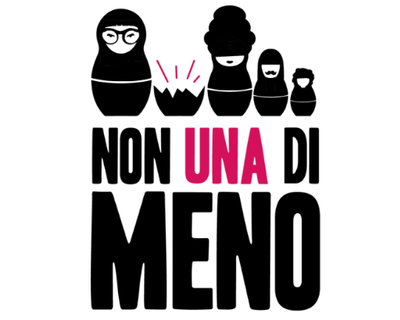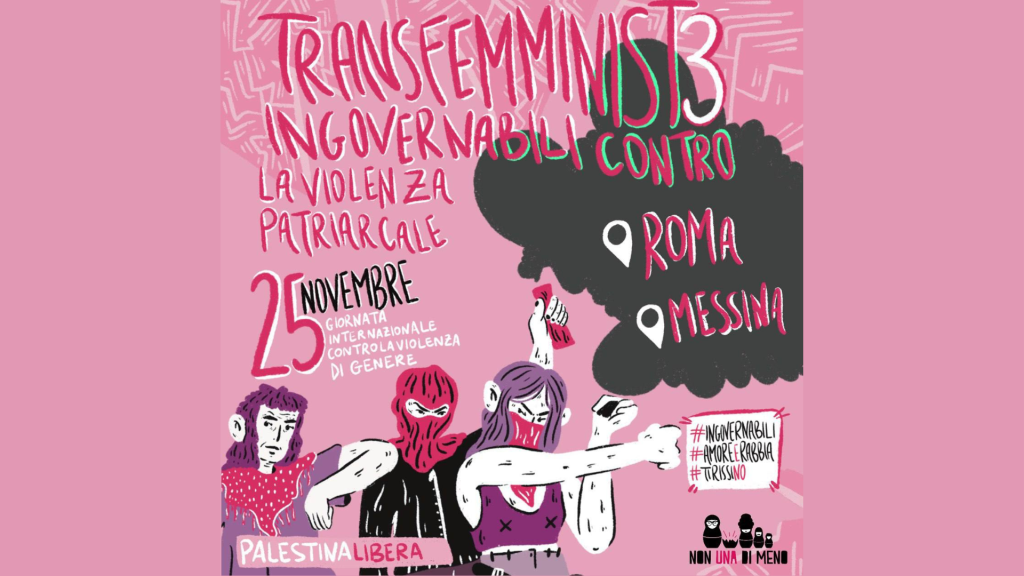Twice a week in Italy the same terrible event takes place. A woman is killed by a man. Usually he knows her. Figures for femicide are similar in Britain.
In Italy this has become a regular part of the 24 hour news cycle. There is a daily afternoon TV progamme, on the main state channel La Vita in diretta, l similar to Crimewatch which exhaustively goes over the details of these murders. The focus is on the whodunit or lurid aspects of the crimes rather than the patriarchal or sexist structures that produce them.

Recently twenty-two year old Guilia Cecchettin was murdered by her ex-boyfriend, Turetta. As is often the case, he could not accept the fact that she no longer wanted to be with him. She had experienced his controlling behaviour and resentment of her recent graduation as a bio-chemist. He could not handle her achievements and wanted her to slow down her education to match where he was at. He stabbed her, put her in his car thinking she was dead. Police think that he heard sounds so he got out and stabbed her again to finish her off.
Her sister, Elena, has written this eloquent letter denouncing the way the whole narrative of ‘monsters’ and the ‘exceptionality’ of these men fails to understand or combat femicide:
Turetta is often referred to as a monster. He is not a monster. A monster is an exception, a person outside society, a person for whom society should not take responsibility.
Instead, there is responsibility. Monsters’ are not sick, they are healthy children of patriarchy, of rape culture.
Rape culture is what legitimises all behaviour that harms women, starting with things that are sometimes not even given much importance, but which are important, such as control, possessiveness, catcalling.
Every man is privileged by this culture. It is often said ‘not all men’. All men are not murderers, but the murderers are still all men.
No man is good if he does nothing to dismantle the society that privileges them so much. It is the responsibility of all men in this patriarchal society given their privilege and power to educate and call out friends and colleagues as soon as they hear the slightest hint of sexist violence.
Tell that friend who controls his girlfriend, tell that colleague who catcalls passers-by, make yourself hostile to such behaviour. It is accepted by society, but is nothing but the prelude to femicide.
Femicide is state murder, because the state does not protect us.
Femicide is not a crime of passion, it is a crime of power. We need widespread sexual and relationship education, we need to teach that love is not possession. We need to fund anti-violence centres and we need to give those in need the opportunity to ask for help. For Giulia don’t do a minute’s silence, for Giulia burn everything.
Femicide has recently become more of a political issue in Italy. Its first women prime minister, Giorgia Meloni has brought forward new laws that strengthen some anti-domestic violence measures and lays down harsher penalties. Prosecutors will have some new powers to keep men who threaten women away from them and money for refuges has been increased from 35 to 55 million Euros for 2024.
However in Italy the problem is often whether this money gets to the people who need it and does not get diverted or wasted in byzantine bureaucratic costs. Meloni in fact makes these moves while attacking women’s rights and independence with her campaigns in favour of the traditional family and to restrict abortion rights. Violence against women is linked to the inequality embedded in such family structures and condoned by the Catholicism she extols.
Rape culture and sexism have been exposed at the heart of the Italian political elites. Meloni herself broke with her partner, Andrea Giambruno, a TV presenter, after the lewd comments he had made about female colleagues had been exposed.
Beppe Grillo’s son was accused of a group rape and his reaction was to immediately question the validity of the charges and blame the victim. Grillo is a leader of the Five Star Movement one of the main opposition parties. One of the top leaders of Meloni’s party, Fratelli d’Italia, La Russa, also has a son accused of rape. His response was to speculate why the woman did not report it straightaway and question the charges.
This Saturday, November 25 is the International Day for the Elimination of Violence Against Women and Girls (VAWG). It kicks off 16 days of action on the issue. There will be a webinar series of talks and discussion. It is also White Ribbon Day.

White Ribbon Day is a campaign that encourages men and boys to take action to end violence against women and girls and bring about cultural change. It encourages them to make a promise on its website and has lots of educational resources that can be used in schools and clubs.
This year’s theme calls on ‘ supporters to #changethestory for women and girls. This can start with the smallest action to challenge ‘harmless’ behaviours.’
The White Ribbon organisation has teamed up with corporate sponsors like Sky Sports to get presenters to wear white ribbons and a specially produced video that will be broadcast. Targeting male football supporters is part of their strategy to change male attitudes. Rail companies are also participating and there will be activities at stations.
There are actions and events organised by other organisations to mark November 15 too – councils, some colleges and trade unions (e.g. NAS/UWT, NEU), women’s groups and the Labour Party are getting involved in the 16 day campaign. Italian feminist organisations like Non una di Meno (Not one less) are organising a demonstration in Rome to remember Elena and all her sisters who have been killed.
Art (54) Book Review (122) Books (114) Capitalism (68) China (81) Climate Emergency (98) Conservative Government (90) Conservative Party (45) COVID-19 (44) EcoSocialism (56) Elections (83) Europe (46) Fascism (58) Film (49) Film Review (68) France (70) Gaza (61) Imperialism (100) Israel (127) Italy (46) Keir Starmer (54) Labour Party (111) Long Read (42) Marxism (49) Marxist Theory (48) Palestine (173) pandemic (78) Protest (152) Russia (340) Solidarity (145) Statement (48) Trade Unionism (142) Ukraine (347) United States of America (133) War (368)

